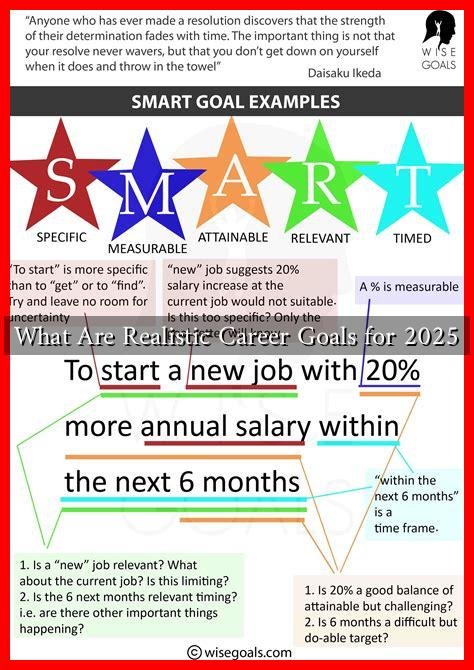-
Table of Contents
What Are Realistic Career Goals for 2025?
As we approach 2025, the landscape of work is evolving rapidly due to technological advancements, shifting economic conditions, and changing societal values. Setting realistic career goals is essential for navigating this dynamic environment. This article explores what realistic career goals look like for 2025, providing insights into emerging trends, necessary skills, and actionable steps to achieve success.
Understanding the Future of Work
The future of work is characterized by several key trends that will shape career opportunities and expectations. According to a report by the World Economic Forum, by 2025, 85 million jobs may be displaced by a shift in labor between humans and machines, while 97 million new roles may emerge that are more adapted to the new division of labor between humans, machines, and algorithms.
Key Trends Influencing Career Goals
- Remote Work: The COVID-19 pandemic has accelerated the adoption of remote work, making it a permanent fixture in many industries.
- Digital Transformation: Companies are increasingly investing in digital tools and technologies, creating demand for tech-savvy professionals.
- Focus on Sustainability: There is a growing emphasis on sustainability and corporate social responsibility, leading to new roles in green technology and sustainable business practices.
- Soft Skills Demand: Employers are prioritizing soft skills such as communication, adaptability, and emotional intelligence alongside technical skills.
Setting Realistic Career Goals
With these trends in mind, it’s crucial to set realistic career goals that align with both personal aspirations and market demands. Here are some examples of achievable career goals for 2025:
1. Upskill and Reskill
As industries evolve, continuous learning is vital. Consider the following:
- Enroll in online courses or certifications relevant to your field.
- Attend workshops and seminars to stay updated on industry trends.
- Join professional organizations to network and gain insights from peers.
For instance, platforms like Coursera and LinkedIn Learning offer courses in data analysis, digital marketing, and project management, which are increasingly in demand.
2. Embrace Remote Work Opportunities
With remote work becoming mainstream, aim to:
- Seek positions that offer flexibility in work location.
- Develop skills in virtual collaboration tools like Zoom, Slack, and Asana.
- Build a personal brand online to attract remote job opportunities.
According to a survey by Buffer, 97% of remote workers would recommend remote work to others, highlighting its growing acceptance.
3. Focus on Sustainability
As businesses prioritize sustainability, consider goals such as:
- Pursuing a career in renewable energy or sustainable business practices.
- Engaging in corporate social responsibility initiatives within your organization.
- Staying informed about environmental regulations and sustainability trends.
For example, companies like Tesla and Beyond Meat are leading the charge in sustainable practices, creating numerous job opportunities in these sectors.
Case Studies: Successful Career Transitions
Several professionals have successfully navigated their careers by setting realistic goals aligned with emerging trends:
- Jane Doe: A former marketing manager transitioned to a digital marketing specialist by upskilling through online courses, resulting in a 30% salary increase.
- John Smith: An engineer shifted to a role in renewable energy after completing a certification in sustainable engineering, contributing to a major solar project.
Conclusion
As we look toward 2025, setting realistic career goals is more important than ever. By understanding the trends shaping the future of work and aligning personal aspirations with market demands, professionals can position themselves for success. Whether it’s upskilling, embracing remote work, or focusing on sustainability, the key is to remain adaptable and proactive in pursuing career growth. Remember, the journey to achieving your career goals is ongoing, and staying informed and engaged will be your greatest asset.
For more insights on career development, consider visiting Forbes Careers.


